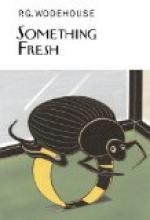Lord Emsworth was feeling too benevolent to raise the objections he certainly would have raised had his mood been less sunny.
“Certainly; let him come if he wishes.”
“Thanks, gov’nor.”
Freddie completed his toilet.
“Doing anything special this morning, gov’nor? I rather thought of getting a bit of breakfast and then strolling round a bit. Have you had breakfast?”
“Two hours ago. I trust that in the course of your strolling you will find time to call at Mr. Peters’ and see Aline. I shall be going there directly after lunch. Mr. Peters wishes to show me his collection of—I think scarabs was the word he used.”
“Oh, I’ll look in all right! Don’t you worry! Or if I don’t I’ll call the old boy up on the phone and pass the time of day. Well, I rather think I’ll be popping off and getting that bit of breakfast—what?”
Several comments on this speech suggested themselves to Lord Emsworth. In the first place, he did not approve of Freddie’s allusion to one of America’s merchant princes as “the old boy.” Second, his son’s attitude did not strike him as the ideal attitude of a young man toward his betrothed. There seemed to be a lack of warmth. But, he reflected, possibly this was simply another manifestation of the modern spirit; and in any case it was not worth bothering about; so he offered no criticism.
Presently, Freddie having given his shoes a flick with a silk handkerchief and thrust the latter carefully up his sleeve, they passed out and down into the main lobby of the hotel, where they parted—Freddie to his bit of breakfast; his father to potter about the streets and kill time until luncheon. London was always a trial to the Earl of Emsworth. His heart was in the country and the city held no fascinations for him.
* * *
On one of the floors in one of the buildings in one of the streets that slope precipitously from the Strand to the Thames Embankment, there is a door that would be all the better for a lick of paint, which bears what is perhaps the most modest and unostentatious announcement of its kind in London. The grimy ground-glass displays the words:
R. Jones
Simply that and nothing more. It is rugged in its simplicity. You wonder, as you look at it—if you have time to look at and wonder about these things—who this Jones may be; and what is the business he conducts with such coy reticence.
As a matter of fact, these speculations had passed through suspicious minds at Scotland Yard, which had for some time taken not a little interest in R. Jones. But beyond ascertaining that he bought and sold curios, did a certain amount of bookmaking during the flat-racing season, and had been known to lend money, Scotland Yard did not find out much about Mr. Jones and presently dismissed him from its thoughts.




